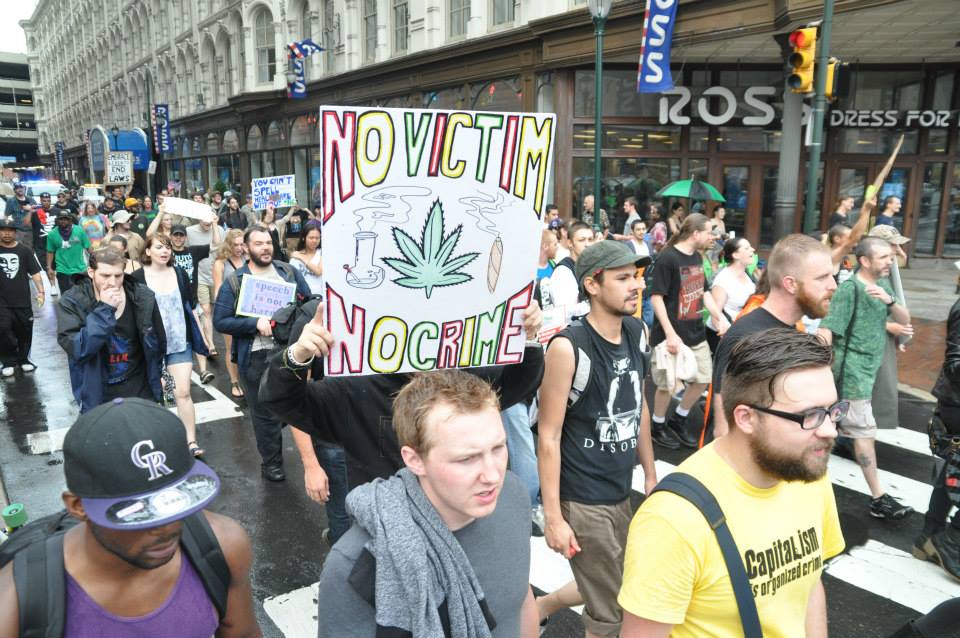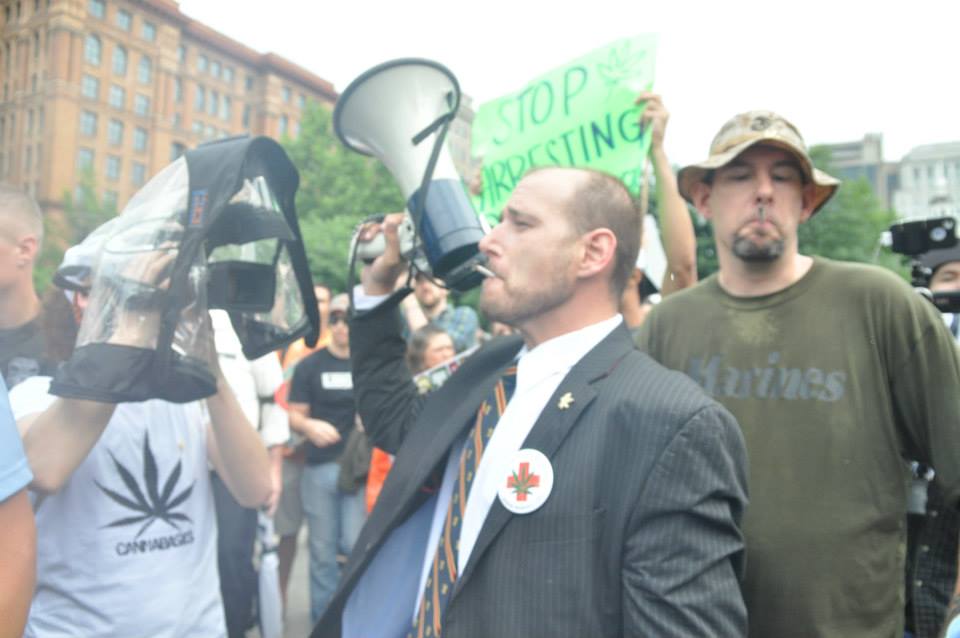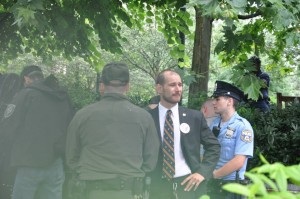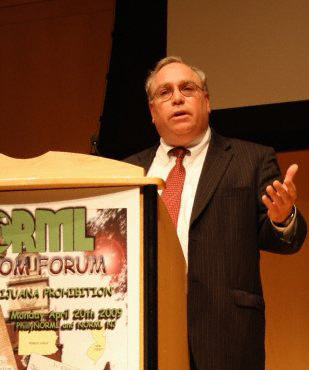
6/30/13 Drug War Tour on the march (photo by Elkanah Grogan)
PHILADELPHIA by Chris Goldstein 7/4/2013
We are celebrating an incredible revolution of ideas this week, one that has a living pulse today.
The Philadelphia of 1776 housed the women and men who crafted a new future for freedom. In 2013 it is where the United States federal government is displaying the tremendous cost and energy it will spend to arrest Americans simply for smoking marijuana.
On Sunday June 30th scores of Department of Homeland Security (DHS) agents and National Park Service (NPS) Rangers along with Philadelphia Police (PPD) participated in a coordinated disruption of the monthly “Smoke Down Prohibition” protest in front of the Liberty Bell.
The six-month old event is organized (loosely) by comedy crew The Panic Hour and reform group PhillyNORML.
At 4:20PM many in the crowd lit cannabis joints in a symbolic protest against federal laws…as they have each month (in the same spot) since December 2012.
This time more than eighty members of law enforcement (all with guns, some in riot gear) were sent into the group of about 100 peaceful cannabis consumers who had just respectfully marched all the way from City Hall (in the rain) without incident.
But when protesters arrived at The People’s Plaza over a dozen people were roughly dragged to the ground by police, agents and rangers. Eight people were issued citations. I was one of those cited.
Video – http://youtu.be/HJisWNBFaz0 Photo set –
The strategies and tactics employed by the multiple agencies are a real window into the marijuana policy problem overall. More than 750,000 Americans will be treated the same way this year by police just for a small amount of pot; but most of the actual arrests won’t be so well documented.
President Obama, top-level politicians along with agency heads at the DEA, ONDCP and others claim that federal laws against possession of a few grams of weed isn’t on their radar. But that is a lie. We can see just how the federal government feels about marijuana legalization in their militarized response to a group of Americans openly carrying a little bit of cannabis.

Photo by Elkanah Grogan – 4:18PM on 6/30/2013 at Independence Mall
Drug War Tour
Sunday’s event was much more positive than the 15 minutes of intense police action against us.
Around 2:30PM a dedicated group of marijuana reform activists gathered under drenching but not uncomfortable summer rain in Love Park. Among the tourists snapping pictures we handed out leafy signs and umbrellas, staying upbeat with the comedy of The Panic Hour and a talk from anarchist writer Larkin Rose…both are actually best enjoyed standing in the rain anyway…like a Nine Inch Nails concert.
The Drug War Tour of Philly was organized by Mike Whiter, a US Marine combat veteran who wants Pennsylvania to legalize medical marijuana.
Participants included some seasoned activists like libertarian Adam Kokesh and Capt. Ray “Occupy” Lewis, the retired Philly Police Captain arrested at Occupy Wall Street. There were people of all ages and nearly every ethnicity, including a man in a wheelchair and a couple with a baby. We made for an excellent representative cross-section of our country.
Many were familiar faces to me; these are the people who have the courage to put forth a real effort for legalization. Everyone was there to walk twelve blocks in steady rain to ultimately enter a cage filled with federal agents for a joint smoking session.
The resolve and honest good nature of every single person involved remains an inspiration. Marching with them is always a privilege.

Steve Miller-Miller chants (photo by Elkanah Grogan)
At 3:15PM we left Love Park with local comic Steve Miller-Miller on the microphone “1-2-3-4 End The Lunatic Drug War!”
The amplifier was on the back on an old Army pickup truck (driven by an affable Libertarian survivalist), fittingly at the lead of the parade.
The event had a permit and an official police escort along with a PPD Civil Affairs unit. About ten Philly cops on bikes and in SUVs were focused on politely closing off intersections for our street march.
Our first stop was the West side of City Hall where I gave a talk directed toward Mayor Michael Nutter.
“There are more than 4,000 arrests each year in Philadelphia for marijuana and more than 80% of those are black men and women – but Mayor Nutter could de-prioritize marijuana possession.”
“Marijuana reform doesn’t have to start in Washington DC, it doesn’t have to start in Harrisburg it can start right here at City Hall.”
A recent resolution passed by the National Conference of Mayors pleaded with federal authorities to allow cities to direct their own criminal cannabis policies – reducing penalties. But a recommendation by the ACLU in their report highlighting the racial disparity to pot enforcement could be enacted by the Mayor at any time: de-prioritization; this directs police and prosecutors to take on serious crimes instead of busting people for weed.
Chants of “END THE DRUG WAR!” and “What do we want? LEGAL WEED! When do we want it? NOW!” echoed from the faces of the Gotham-style structure of Philly’s City Hall as we made our way up Market Street.
We had one more stop on our journey that turned into a powerful visit.
At 7th Street we made a left went one block to land in front of the Federal Detention Center. This is where comedian NA Poe and broadcaster Adam Kokesh were held on felony charges after DHS, Park Rangers and Philly Police arrested them at the May 18, 2013 “Smoke Down Prohibition” rally. (Video – http://www.liveleak.com/view?i=594_1369103091 )
Kokesh and Poe were held in the same cell inside for five days and they both spoke in front of the FDC,
“A lot of people are locked up in there because of the Drug War,” said Poe, but then there were several, very welcome interruptions to their speeches.
At first I thought some heavy rain might be falling nearby or a low, persistent thunder. But it was the prisoners inside the FDC banging on the windows in response to the protest on the street.
This was a profound and unique moment. We raised our voices with the prisoners of prohibition; the communication of the message was acknowledged by both sides. I saw tears mixing with the rain as cheers mixed with banging; a choir of voices, unified; all for legal marijuana.
6/30 FDC Video – http://youtu.be/HGtTH4_D8hE?t=5m53s
Keeping on schedule to reach the Liberty Bell by 4:20 we moved on with the march. In the 8tt Street underpass we took a break from the rain and listened to Ray Lewis give his view of drug laws.
The retired Philadelphia Police Captain used to respond to a lot of domestic violence calls, none of them he attributed to marijuana – but a lot of them seemed fueled by alcohol. The former cop joins a growing number of his colleagues who are taking the time to end a voice for change.
We continued our lively parade, a visible expression of a majority of Americans (likely even cops) in favor of legalization. We were energized by the brief respite and chanting for an end to cannabis prohibition.
In the distance we could see the massive police presence waiting for us.
Slowing leading the green camo truck up the center of a wet, reflective Market Street under cloudy skies to the small army of agents in front of Independence Hall was surreal. All of the protesters were calm.

6/30/13 marijuana march arrives at 5th and Market (Photo by Vanessa Maria at The Panic Hour)
Freedom cages and riot rangers
The area preserved for First Amendment activity at 5th and Market Street was ringed by metal barricade fencing when we arrived at 4:12. It is usually left open. We called it a “freedom cage” and walked inside.
Several dozen (visible) Department of Homeland Security agents deployed to our pot demonstration were in full black tactical gear with bullet-proof vests festooned (presumably) with extra magazines and other lethal equipment.
The several dozen Philly Police were all wearing baseball batting gloves (really) along with their guns and handcuffs.
National Park Service Rangers wore bullet-proof vests and were all carrying guns but there were also some special Rangers literally in GREEN riot gear with batons and helmets.
Oddly the US Fish and Wildlife Service also had another officer (also with a gun) who actually laid hands on a protester.
A processing tent was erected off to the side and staffed by more DHS, Rangers, Police and even the US Attorney’s Office.
Again this entire operation was staged because a group of Americans announced that we would smoke a joint at 4:20PM. (It probably even had a snappy code name…)
The federal response to this peaceful protest was way out of proportion. 
I helped to lead the 4:20PM countdown at the first “Smoke Down Prohibition” in December and again at the largest gathering (so far) on April 20, 2013. There were only a few regular Rangers off in the far distance on those occasions. There was no metal fencing. One Ranger was close-by on 4/20/13 smiling and holding a video camera; not (visibly) armed with a gun.
A tolerant pragmatism on both sides and respectful détente seemed to be in effect among the local protesters and Rangers. So the disproportionate new tactics rolled out in May and June are clearly coming somewhere from the top -down.
Members of our group, including yours truly, were ready to take part in a civil disobedience action (openly smoking a marijuana joint) and to receive a citation. Smoking pot in public is something a reasonable person (even law enforcement) can agree is a minor issue, especially in the context of civil disobedience.
But Homeland Security, Park Rangers and Philly Police did not come with books of tickets, pepper spray and zip-ties; they appeared with loaded guns and metal handcuffs.
The world can now see the truth of US cannabis prohibition policy each month in Philadelphia. All of our federal AND local law enforcement resources are being aggressively deployed just to bust people with a joint.
Getting Cited

Chris Goldstein and Mike Whiter 4:20PM on 6/30/13 (photo by Elkanah Grogan)
Mike Whiter and I stood next to each other sharing a bullhorn with Ed “NJWeedman” Forchion at 4:19PM inside the federal freedom cage. Mike was wearing an olive green t-shirt with “Marines” emblazoned across it; I was in a pinstripe Ralph Lauren suit.
The rain stopped and the sun had just broken through the clouds over Independence Hall for the first time that day. The crowd huddled around Mike and me, not by design but by instinct.
We counted down from 20 seconds, the crowd got tighter but there was a small open circle right in front of me. People were already being pulled away from the edges and the atmosphere grew tense. Still I knew everyone was non-violent and sensed that everyone was prepared for the action.
As I got down from 10 seconds I put a joint in my mouth and when we reached “4:20” several lighters were held aloft and I lit it. Immediately squads of law enforcement weaved throughout the crowd. The young man on my left was pulled roughly away. I kept smoking the joint and told everyone to remain calm though the bullhorn.
I saw a tall Black man with long dreads holding only a video camera getting dragged to the ground by Rangers and Philly Police. Civil Affairs officers were rushing through the crowd as well. They seemed to be observing and even directing some arrests while ignoring others.
Those assembled made a powerful and poignant protest raising awareness for marijuana legalization. As their friends were roughly handled the Smoke Down participants shouted “No Victim; No Crime!” and many kept smoking.
I kept on toking my skinny but fragrant joint, catching the toughest buzz of my life. Mike got on the bullhorn pointing out that we were openly smoking marijuana…and that it was “really good” cannabis. Finally a local National Park Service Ranger approached me.
Since 2010 I’ve been peacefully protesting at 5th&Market for a variety of good causes. This particular Ranger and I had cordially interacted before. He wore a bark-brown and dark green uniform and reached up with a black leather glove to take the joint asking, “Is that marijuana?”
 I smiled and said, “Yes, of course!” easing the joint from my right hand into his fingers as he seized my left elbow. He led me on a half-turn and we calmly walked over to the processing tent; a Philadelphia Police officer was at my right elbow and a Homeland Security agent followed behind.
I smiled and said, “Yes, of course!” easing the joint from my right hand into his fingers as he seized my left elbow. He led me on a half-turn and we calmly walked over to the processing tent; a Philadelphia Police officer was at my right elbow and a Homeland Security agent followed behind.
Two separate Philly cops asked that I be handcuffed, but the Ranger replied that it was not necessary to both.
Mike continued smoking his joint for a few more puffs but was seized just after me in the same calm manner. Our interactions did not appear to be the norm. Many of those seized were needlessly manhandled and most were immediately released with no citations and no apology.
Over at the processing tent a man who had been carried over in handcuffs was yelling in pain saying his shoulder hurt from the position. His cuffs were eventually removed and he was sent away on an ambulance. Some of those detained were cited for “interference” not marijuana possession because they were seized while smoking tobacco cigarettes. Those cases could end up in court.
The Ranger briefly patted me down and asked for identification. I gave over my driver’s license and silently waited my turn.
I could see a Deputy US Attorney along with other higher-ups. Suddenly the Chief Ranger at Independence Mall National Historic Park, Patrick Suddath, came up and asked for me by name, then remarked that I was “overdressed.”
Suddath and I have interacted (cordially) before; during the local Occupy Wall Street encampment I traded my suit for cold weather gear.
“Liberty Bell tie; it’s for media appearances here,” I said. 
The tie was a gift from fellow cannabis activist Colleen Begley; she bought it at the Independence Visitor Center gift shop. I hope Suddath noticed. He was quickly pulled away in another conversation.
Twenty minutes later the Rangers had filled out my citation for possession of a controlled substance and put the remaining ¼ of a joint into a plastic evidence bag. My name was then run for outstanding warrants and a Ranger took a digital photograph of me with the citation.
My interaction was boring, civil and by-the-book. But like all pot prohibition enforcement, they did not treat everyone the same way.
Video – http://youtu.be/HJisWNBFaz0 Photo set –
Rolling forward
Plans are already in the works for the July edition of “Smoke Down Prohibition.” Fundraising will take place to cover some of the citation fines from June and remain active for future events. Organizers and participants are determined to grow the action, swelling the number of cannabis consumers.
It is bizarre to be targeted by federal law enforcement in this fashion. Philadelphia Police Civil Affairs officers made a point tell us they had been briefed about the protest earlier in the week by federal agencies. This was likely a mild intimidation tactic but also an insight into the intense planning that went into the interruption of our protest.
Although fully armed and with just under one hundred cops, agents and rangers (don’t forget US Fish and Wildlife) law enforcement did not wait until 4:20PM but immediately encroached upon the protest – pulling people away before any joints were lit.
They interrupted our ability to peacefully gather and seek redress of our government. All of the officers who pledge to protect the US Constitution stood next to a monument to the First Amendment and willfully ignored it. Ultimately this is the length to which the federal government has always gone to defend and enforce this harmful policy – but now it is out in the open, symbolically and tangibly, for all to see.to
The heavily armed; grandly choreographed efforts against this awareness campaign for legal marijuana should be disturbing to all Americans.
Perhaps this is a hint into the Department of Homeland Security’s future tactics against cannabis consumers in Washington and Colorado. Or the reality could be that federal agencies take this approach to disrupt many groups simply for organizing around a political issue.
That is why I plan to continue participating in these monthly actions. We are not afraid to embrace our freedom.
My Green Pledge
The ability for The People to use the cannabis plant as we wish is a Civil Right and a Natural Right.
When the government insists on pursuing destructive forms against its own citizens it is our responsibility to dig deep and empower the foundations of our principals as a nation.
We the People hold unquestionable Civil and Human Rights to alter our United States government and organize it for our Safety and Happiness.
For seventy-five years we have endured the Prohibition of Cannabis at tremendous cost to our Lives and Liberties. We experience the current enforcement of these unreasonable laws as a modern tyranny.
We have diligently employed every legal and legislative avenue for decades to combat this injustice only to have all tiers of Government alter their form to maintain a policy that makes us suffer – by the millions – each year.
We The People of the United States of America are declaring our Right to utilize Cannabis.
Many of us will publicly exercise our liberties each month in front of Independence Hall, peacefully upholding the best of all American traditions in the face of armed federal troopers, until prohibition comes to an end.
One day I hope that same National Park Service Ranger can take a joint out of my hand not to cite me, but to share.

Happier times: The fourth "Smoke Down Prohibition" protest 4/20/13: there were no arrests or citations
 Chris Goldstein is a respected marijuana reform advocate. As a writer and radio broadcaster he has been covering cannabis news for over a decade. He volunteers with local groups to change prohibition laws including PhillyNORML and The Coalition for Medical Marijuana New Jersey.
Chris Goldstein is a respected marijuana reform advocate. As a writer and radio broadcaster he has been covering cannabis news for over a decade. He volunteers with local groups to change prohibition laws including PhillyNORML and The Coalition for Medical Marijuana New Jersey.















